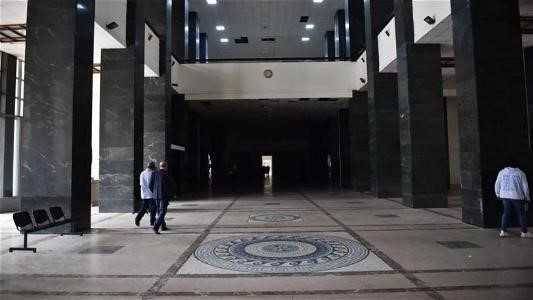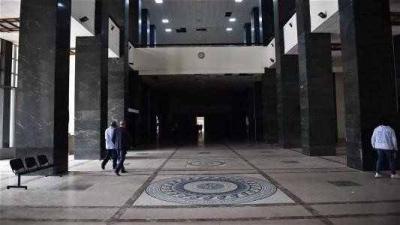The grant provided to judges through their solidarity fund has opened the door for their gradual return to work, temporarily. One judge explained to "Nidaa al-Watan" that the legitimate demands met by the political authority, particularly in financial terms, represent a temporary solution for a maximum of five months. However, the main issue for them remains the political obstacles preventing Finance Minister Youssef Khalil from issuing the decree on the partial formations of judges, and the return of the public body of the Court of Cassation to resume its work and address the requests for recusal and litigation before it.
Although some judges resumed work at the beginning of the year, judicial sources, who chose to remain anonymous, indicated that the lack of a central decision to announce the strike at that time prevents issuing a decision to retract it. This follows a decision to escalate via a WhatsApp group comprising nearly 500 judges, where approximately 420 of them voted in favor of an open strike due to the worsening living and financial challenges that hinder their ability to carry out their duties. This leaves the decision to return from the strike in the hands of each individual judge, with an expectation that the level of acceptance of the solutions provided to them will become clear at the beginning of next week.
During a field visit by "Nidaa al-Watan" to one of the courts of justice, it was observed that the situation prior to the strike remains unchanged. Judicial assistants are alternating attendance, limited to two days a week. Electricity, like the state of the country, is completely cut off. Meanwhile, subscriptions to private generators or securing fuel for such generators in the courts, if they exist, are pending the unavailable budget. Some employees encountered yesterday complained about working by phone light, while darkness filled the hallways, offices, and some courtrooms. Regarding the possibility of judges resuming work under these conditions, one indicated that it is impossible to work without securing electricity during official hours, especially since most of the judges' offices are located in the lower floors, which do not receive natural light, and some courtrooms will remain inactive until litigants can be notified.
One judicial assistant conveyed that the judge he assists informed him of his intention to address only urgent and pressing matters, contrary to previous practice. This reopens the door to discretionary handling of files and neglecting others due to increased pressure and the accumulation of pending complaints throughout the past period. Although the strike ultimately contributed to improving the judges' living conditions, albeit slightly, its repercussions have adversely affected lawyers and some law offices that suffered material damage, as stated by the President of the Beirut Bar Association, Nader Kassar, to "Nidaa al-Watan."
Kassar emphasized that both the authority and justice do not take a break, affirming the lawyers' support for the judges and calling on the political authority to grant them their rights and secure the necessary budget for the courts. He noted having information about some judges agreeing to the grant they will receive, while others are hesitating to return from the strike until a permanent solution is established, after the temporary solution included transferring 20 billion Lebanese pounds monthly for the next five months to the judges' solidarity fund alongside increasing their salaries and providing some other assistance.
While Kassar awaits the end of the holiday period to clarify the picture and the percentage of response to the demands aimed at ending the strike and the judges' refusal to fulfill their responsibilities, he explained that coordination is ongoing between the Bar Associations of Beirut and the North to assess the next escalatory steps. These may start with an official request for all lawyers, approximately 14,000 in number, to carry out a "Day of Anger" at the courthouse, expressing their absolute rejection of the disruption of the judicial authority, especially as UN documents and the Universal Declaration of Human Rights guarantee the right to litigation, which is currently suspended in Lebanon due to judges' refusal to issue judgments and decisions that are strictly within the jurisdiction of the judiciary and its power, which cannot be replaced by anyone else. He urged the judicial authority to "eliminate the consideration of any future strikes by judges from the dictionary in Lebanon."




